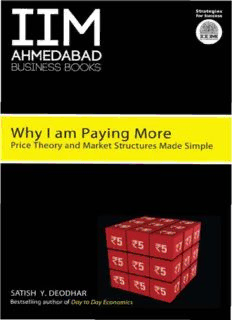
Why I Am Paying More PDF
Preview Why I Am Paying More
Why I am Paying More Price Theory and Market Structures Made Simple Dear Reader, Satish Deodhar’s second book in the IIMA Business Books series, published in collaboration with Random House, is informative and stimulating. The book begins with a clear discussion of basic microeconomic concepts, such as utility, cost, supply and demand curve, price determination, producer and customer surplus, and dead weight loss. Satish next moves to a crisp exposition of various forms of market competition—perfect competition, monopoly, monopolistic competition, and oligopoly. He highlights various mechanisms that producers might use to extract consumer surplus and provides a lucid exposition of game theory, made all the clearer with examples such as ‘Phoolan Devi and Veerappan facing prisoners’ dilemma’. The book proceeds to a description of various forms of market failure and the role of regulation in addressing them. The last chapter provides retrospection through the topics covered and ends with an intriguing crossword. At the end of each chapter, references afford interested readers the opportunity to explore topics in further depth, and ready reckoners provide descriptions of key terms. In a deceptively simple manner, the book offers practitioners a thorough and in-depth perspective on a broad swathe of microeconomics topics. Throughout, Satish explains these concepts in a straightforward manner, clarified with the help of simple and intuitive charts and peppered with rich instances from business and daily life. Why I am Paying More is one of a series of books authored by IIMA professors who are not only academically proficient but also have rich experience in consulting and teaching executives. These books are intended to disseminate knowledge in relevant topics in management to practicing executives. Written in conversational style with illustrations from the world of practice, the books are eminently readable and applicable in daily life. I am confident you will enjoy Why I am Paying More, as you will other books in the series. Please do let us know if there are particular topics that you would like covered in the books published in this series. Ashish Nanda Director IIM Ahmedabad ." .... .. , 11M ~- @ I{5J AHMEDABAD BUSIl\ESS BOOKS Why I am Paying More Price Theory and Market Structures Made Simple Also by Satish Y. Deodhar Day to Day Economics SATISH Y. DEODHAR Published by Random House India in 2013 Copyright © Satish Y. Deodhar 2013 Random House Publishers India Private Limited Windsor IT Park, 7th Floor, Tower-B A-1, Sector-125, Noida-201301, UP Random House Group Limited 20 Vauxhall Bridge Road London SW1V 2SA United Kingdom This eBook is copyright material and must not be copied, reproduced, transferred, distributed, leased, licensed or publicly performed or used in any way except as specifically permitted in writing by the publishers, as allowed under the terms and conditions under which it was purchased or as strictly permitted by applicable copyright law.Any unauthorised distribution or use of this text may be a direct infringement of the author’s and publisher’s rights and those responsible may be liable in law accordingly. EPUB ISBN 9788184005110 To Deepali, partner-in-life I met a score years ago and to Sylee (17) and Yash (13), the most formidable domestic teen cartel! CONTENTS Preface Acknowledgements 0. Introduction 1. Utility and Market Demand 2. Cost Concepts and Market Supply 3. Societal Welfare, Free Enterprise, and Market Price 4. Price Ceiling, Price Floor, and the New Support Paradigm 5. Perfect Competition 6. Monopoly 7. Pricing to Extract Consumers’ Surplus 8. Monopolistic Competition 9. Oligopoly 10. Market Failure and the Government 11. Retrospection A Note on the Author A Note on the IIMA Business Books PREFACE This book may be considered as a sequel to my first book, Day to Day Economics. When Day to Day Economics was published, I was quite apprehensive about the acceptance of the book by readers. However, there was a pleasant surprise in (book) store! Readers were very kind to me and they turned out to be quite an extrovert lot. They would send sporadic emails or post reviews on blogs and online bookstores expressing their liking for the book. Students and participants from various management programmes at IIMA also complimented me for making economics accessible and relevant. While this was a humbling experience for me, readers discerningly pointed out that the book had focussed mostly on macroeconomic issues. It was suggested that I should also write a similar book on microeconomic issues—issues which would describe why in most cases economists vouch for free enterprise system, how prices are set in different market structures, and what are the circumstances that justify government’s role in free enterprise system. These suggestions sounded almost like the Sanskrit aphorism, Atha to Brahma Jidnyasa—an inquisitiveness to know the ultimate reality! Writing a textbook on microeconomics would not have served the purpose, for the market for textbooks has already become overcrowded. The challenging task was to write a book that will appeal to the intuition of non- economists and non-academicians. Hence this modest effort—a sequel to Day to Day Economics.
Description: